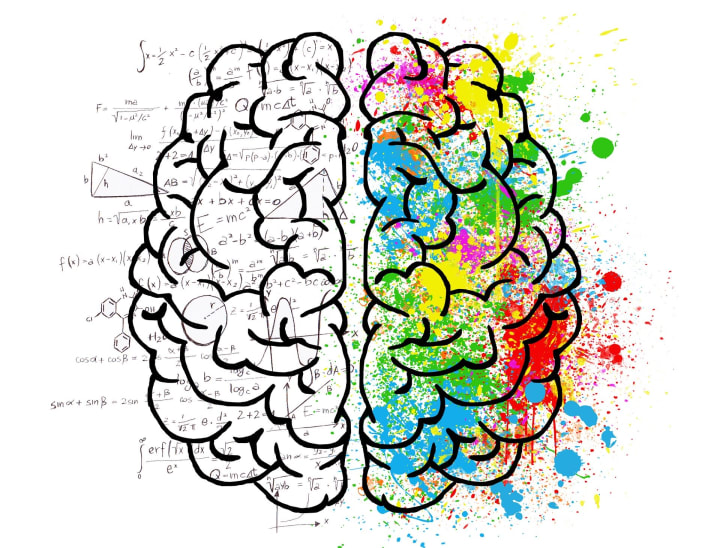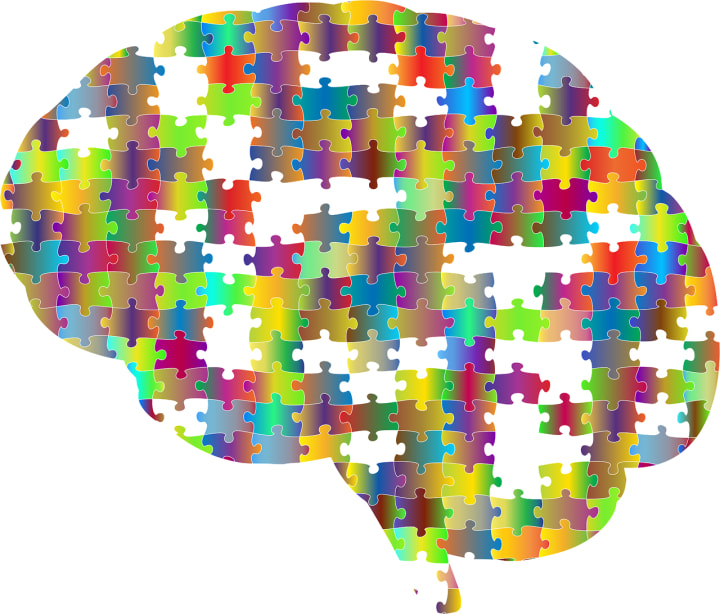The Overlap: Dyspraxia and Autism
Dyspraxia and Autism are NOT the same

DISCLAIMER: I am not a specialist in dyspraxia or autism but as a dyspraxic person, I do have first-hand experience of the difficulties dyspraxic people may face and how dyspraxia can be confused with autism. I have also gained information from reliable sources which I will reference at the end.
PLEASE NOTE: Not all dyspraxic people or all autistic people are the same. The lists provide symptoms of both of the conditions. A person does not always have every symptom and two people with the same condition can have differing symptoms. Symptoms can range from mild, moderate to severe. Most importantly, we all have our own unique personalities.

Amber’s Story
As a twenty four year old who was diagnosed with verbal and motor dyspraxia at the age of seven, my condition has several times been confused with Autistic Spectrum Disorder (ASD). This continued even after I was discharged by my psychiatrist at the age of twelve. She told me that although there were signs I might be autistic, she did not think I was as most of my problems were to do with dyspraxia.
So after years of schools pushing for a diagnosis of ASD, I thought I finally had my answer. But I was very surprised after the label of ASD was stuck on me again. This is because many people do not fully understand what dyspraxia is. Many people are also not aware of the overlap between dyspraxia and autism. I have tested this theory a few times with people and have received responses such as:
‘What’s that?’
‘That’s just physical, isn’t it? Like co-ordination.’
Not quite. Although some people can just have motor dyspraxia, it is also possible to have more than one type of dyspraxia, like myself. Whether you have one or a combination of these types, it can also affect certain aspects of your life which is something I will talk about later on.
Here are the different types of dyspraxia:
• Developmental Verbal (oromotor) dyspraxia. – Difficulty in making and co-ordinating the precise movements needed to produce clear speech with their mouths
• Constructional dyspraxia - this is to do with spatial relationships.
• Ideational dyspraxia - affects the ability to perform co-ordinated movements in a sequence.
• Ideomotor dyspraxia - affects organising single-step tasks.
These types do seem to have been updated recently but I find it much easier to simplify these into verbal and motor as this is how I think of dyspraxia based on my diagnosis.
The final straw for me was a couple of years ago when I was struggling to get a job after completing my MA in Creative Writing (well, I had been applying for things when I was studying to) and when the Wellbeing Service told me that the way I was thinking made them wonder if I had Aspergers. This eventually led me to get an assessment for Aspergers at the age of twenty three. I was told that I did have autistic traits but I was not autistic as my difficulties were mainly to do with dyspraxia. The psychiatrist explained that there is an overlap between dyspraxia and autism.
She even wrote me a letter to give to employers, if I wished to, explaining about my condition and what support I would benefit from as well as a summary of my strengths and difficulties. I did eventually get employed as an Admin Apprentice for the NHS Trust. I did give this letter to my employer after one or two months. I was wary about giving this letter to them straight away in case they didn’t want me to do things the letter said I struggled with but I have learned that it is always best to be open about these things straight away when you start the job so that people know what to expect and so you can get the support you need sooner.
So now, if anyone was to try to stick the label of autism on me again, I would tear it off, because I know I do not have it. However, I would not be ashamed if I did have it. I am, of course, dyspraxic, but although this is a part of who I am, I do not let it define me as a person. Dealing with dyspraxia is difficult enough, but to have the confusion of being told that you possibly have autism after being told that you do not, is very frustrating. It is, of course, possible to have both as the conditions can overlap. To help others who may be going through the dilemma which I went through, I have compiled lists of similarities and differences between the two conditions.

Differences between Dyspraxia and Autism
Let’s start with the definitions:
Dyspraxia
- A developmental disorder of the brain in childhood causing difficulty in activities requiring coordination and movement.
Autistic Spectrum Disorder
- A developmental disorder of variable severity that is characterized by difficulties in social interaction and communication and by restricted or repetitive patterns of thought and behaviour.
As you can tell by the definitions, dyspraxia is primarily considered as something which affects movement and co-ordination whilst autism is primarily thought of as difficulties with social interaction/communication. Perhaps the definition of dyspraxia is something which leads to people believing that dyspraxia is only to do with physical co-ordination.
Interaction

One difference is that people with autism can lack interest in others whereas people with dyspraxia usually do not lack interest but may not always understand how to interact with others but may have trouble in understanding how to do so. This causes great frustration which can manifest as emotional immaturity in some cases.
People with autism can have difficulty reading other’s emotions and they may not like direct eye contact. This may not be as much of a problem for dyspraxic people but they can have problems with knowing what to do in certain situations and may not pick up on social or non-verbal cues as easily as non-dyspraxics.
Habits

Autistic people often dislike change which may be a result of rigidity in thinking. This pattern of thought can cause obsessive or repetitive behaviours and routines. For someone with autism, structure and routine can help them to feel safe from life’s unpredictability which is why stress may be inflicted if the repetition is to be broken. As someone with autism finds change more difficult to deal with than non-autistic people, a structured routine makes them feel like they have control.
In dyspraxic people, things such as obsessions, phobias, fears, compulsions, addictive behaviour and emotional outbursts can often manifest themselves as a result of the difficulties they experience. Where we see an automatic aversion to change in autism, this is not as much the case for dyspraxia. Dyspraxic people may be fearful of change for longer than non-dyspraxic people as dyspraxia means that you will take longer to adapt to change and may find it more difficult to do so. Change can also be frustrating for a dyspraxic person as more than often we have spent so long trying to get used to a situation which we have finally caught up with and then learn we have to adapt to something completely different. So the whole process starts all over again…
Making mistakes

Someone with autism may dislike making mistakes. This again is to do with the rigidity of thinking in autism as there is a theme that everything must be precisely as it should be so that there is a feeling of being in control. Even if the mistake is not very important, it could cause a good deal of stress to someone with autism.
With dyspraxia, thought processes are often more chaotic and slower. We have an idea of what we want to say or do but it does always not come out as we intend. This manifests in things such as movements, co-ordination and articulation. These things can include speech, grip (writing or steering), spatial awareness, organisation and expression. Someone with dyspraxia could sometimes appear messy (e.g. bedroom, desk, trouble folding things neatly or spillages when eating), clumsy (trip over things or bump into them, trouble co-ordinating a sequence of movements), easily distracted and have trouble doing two things at once. In my personal opinion, people with dyspraxia can be so used to making mistakes that they may not experience as high a level of stress from this as someone with ASD does but these mistakes can still be a great source of frustration for a dyspraxic people.
Co-ordination and Planning

We have established that dyspraxia affects movement, co-ordination and in some cases, speech. Messages are not transmitted from the brain to the body effectively. As an example, my psychiatrist once referred to my brain going ‘A, B, D’ instead of ‘A,B,C,D.’ As you can imagine, this makes it very difficult for some dyspraxic people to multi-task. Many, myself included, will try to do two things at once but will have trouble doing so and will be likely to miss out things in the process. Dyspraxic people also have trouble with remembering large amounts of information, will often perform better in small groups as opposed to large groups, will take longer to learn new skills and can find it difficult to concentrate. Breaking tasks down into smaller steps will benefit a dyspraxic person hugely.
Possible areas of difficulty:
• Balance
• Posture
• Physical activity (especially team sports or gymnastics)
• Grasping small objects
• Writing/Drawing
• Typing
• Time management
• Organisation
• Concentration
• Tying things together
• Some daily living skills
• Distinguishing left from right
• Spatial awareness
• Pronunciation
• Slower speech
• Controlling pitch or volume of voice
Please note that someone with dyspraxia may not necessarily have all of these. This does not render anyone with dyspraxia incapable of any of the things in this list. These areas can improve over time, especially with the right practice and support.

In comparison, people with autism are often good at retaining large amounts of information. An aspect of organisation which someone with autism may find challenging is if the organisation involves a lot of steps. As autistic people can have an impressive ability to focus on small details, they may find it challenging to focus on the bigger picture. Again, breaking tasks down into smaller steps is greatly beneficial to someone with autism as it is to someone with dyspraxia. It is also a good idea to establish how much time should be spent on each task, especially if there is a difficulty with understanding the concept of time, as there can be in autism. Timers, alarms or visual prompts are often effective for this purpose.
Regarding co-ordination, arm flapping and walking on tiptoes can be common signs of autism. People with autism may often have difficulties with motor co-ordination. Autistic people may have poor muscle tone and poor motor planning. Like dyspraxia, autism can also affect speech but in a different way. Where dyspraxia is where you can have trouble forming certain sounds or words and controlling pitch/volume, autism is perhaps more to do with the language development taking longer. Some people with autism may repeat things (as dyspraxic people might) or speak in a more formal, monotone or sing-song voice. There could also be variations in tone. Speech could either be slower or faster but this is not necessarily always the case. Autistic people may also have a rich vocabulary.
Please note that these things may not apply to all autistic people. The autistic spectrum is absolutely huge and the characteristics or symptoms which an autistic person presents may depend on the severity of the autism. As is the case with dyspraxia, these things can be better managed, especially with the right practice and support.
Struggles with imaginative play or activity

In some cases, having autism can mean looking at things in a very much black and white way. Imaginative play or activity can involve pretending and someone with autism may see this as a lie. Again, this is the rigid pattern of thinking coming into play. Imaginative play risks disrupting the ‘truth.’ But I don’t believe that this is the case for all autistic people as there is also evidence that people with autism can display good creativity. For instance, they are often able to notice little details which others may not. All you have to do is think of examples of creative geniuses who are on the autistic spectrum like Bill Gates and Dan Ackroyd.
Dyspraxic people, maybe more so in childhood, may initially need help coming up with ideas and starting these types of activity. However, this is something which I don’t really feel fits all dyspraxic people as some studies show that dyspraxic people can be very creative. Difficulties with imagination is not something which applies to me. Creativity and writing are my strengths. I have no trouble with understanding metaphor and some sources show that children with speech difficulties may have trouble understanding metaphor. Even if dyspraxic people initially need help with imaginative play or activity, I suspect that once they get the hang of it, they are fine, like with many things.
Possible difficulties Dyspraxia and Autism share

- Social situations
- Dealing with emotions
- Picking up on social or non-verbal cues
- Over sensitive or under sensitive to sensory stimuli
- Tend to take things literally
- Concentration and distraction
- Take longer to understand information
- Fidgety
- Motor Skills and planning
- Speech and language development
- Impulsive
- Perception and thought
- Adapting to change
- Organisation
- Time management
- Some daily living skills
Possible strengths of Dyspraxia

• Determination and resilience
• Enthusiastic and passionate about interests
• Thinking differently/creatively (outside the box)
• Good long term memory
• Notices details other people do not
• Appreciate things other people take for granted
• Quirky and unique
• Sense of humour
• Sensitivity and empathy for others, particularly those who are struggling.
Possible strengths of Autism:

• Average to very high intelligence
• Good verbal skills, rich vocabulary
• Ability to absorb and retain large amounts of information, especially about special interests
• Ability to think in visual images
• Self-motivated, independent learners
• Propensity to think outside the box and generate new solutions to problems
• Detail orientated
• Unique humour
• Honesty
As I stated at the start, all strengths and difficulties will vary depending on the individual. People may encompass a mix of these things and two people with the same condition may be better or worse in different areas. We are more than just our dyspraxia or autism, we are our own rich personalities.
References
The last two references each link to a online tests, one for dyspraxia and one for autism. Please not this is not the same as a diagnosis.

https://www.nhs.uk/conditions/developmental-coordination-disorder-dyspraxia/
https://www.nhs.uk/conditions/autism/what-is-autism/
https://www.nhs.uk/conditions/autism/
https://dyspraxiafoundation.org.uk/
http://www.movementmattersuk.org/dcd-dyspraxia-adhd-spld/uk-dcd-consensus.aspx
https://www.ambitiousaboutautism.org.uk/
https://www.readandspell.com/dyspraxia-and-autism
https://integratedtreatmentservices.co.uk/news/autism-dyspraxia-differences/
http://www.autism-help.org/comorbid-dyspraxia-autism.htm
https://www.autism.org.uk/about/what-is/related-conditions.aspx
https://www.readandspell.com/dyspraxia-in-adults
https://www.medicalnewstoday.com/articles/151951
https://neuroknowhow.com/dyspraxia/adult-dyspraxia-questionnaire/
https://www.clinical-partners.co.uk/for-adults/autism-and-aspergers/adult-autism-test






Comments
There are no comments for this story
Be the first to respond and start the conversation.